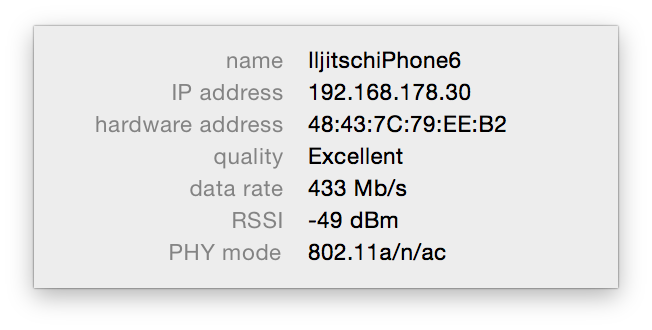
This is the archive for all posts from 2014.
After reading about how more people used mobile data to wish their friends a happy new year, I expected traffic at the Amsterdam Internet Exchange to go up a bit after midnight. But it actually dropped noticeably the first 20 minutes or so of the new year:
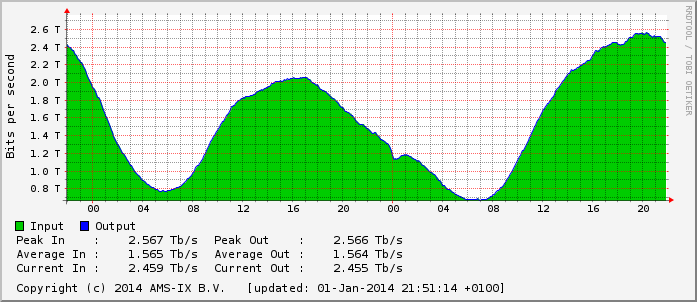
And it was a good deal lower than on a regular night to begin with.
Permalink - posted 2014-01-01
The way I see it, the new Mac Pro really needs an internal 10 Gigabit Ethernet (10GE) interface.
Read the article - posted 2014-01-03
The MiniPlayer is the best thing about iTunes 11, especially if, like me, you enjoy looking at high resolution album artwork. Here's how it works.

Gister was de ISOC nieuwjaarsreceptie voor 2014.
Ik had de eer daar tien minuten te spreken over te kleine pakketten (zie ook hier) en natuurlijk kon ik het niet laten om ook nog even wat te zeggen over de IPv6-vorderingen in 2013.
Read the article - posted 2014-01-10
A long time ago Apple introduced "enhanced" podcasts. These are audio podcasts with chapters, where each chapter optionally has an image and/or a URL. It's a very nice idea, but...
Read the article - posted 2014-01-15
Mocht je tegen vanbeijnumtrainingen.nl aangelopen zijn en daar niet mijn BGP- en IPv6-traningen gezien hebben, dan kan ik dat mysterie oplossen: dit is de website van mijn vader, die trainingen geeft aan nieuwe leden van ondernemingsraden.
Read the article - posted 2014-01-17
I'm probably going to get a new Nikon digital single lens reflex (DSLR) camera. You know, those big cameras that let you attach different kinds of lenses. Even though I got a new regular point-and-shoot (P&S) camera this summer, and my iPhone also takes very nice pictures. So why another DSLR?
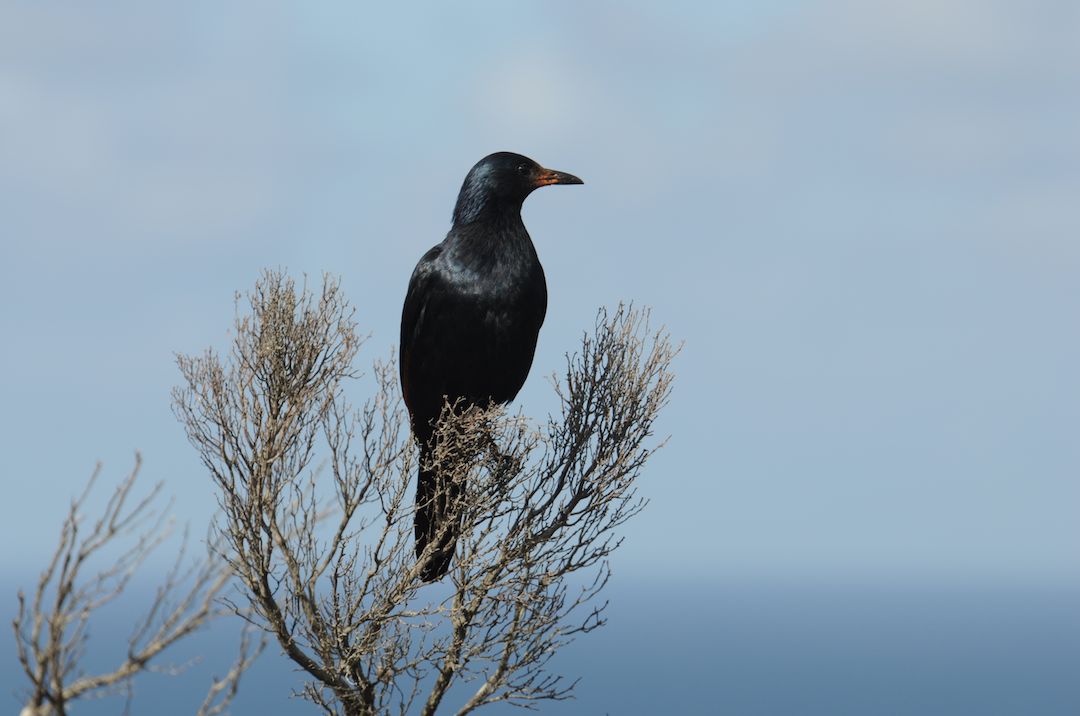
Yesterday, BBC 2 broadcast Sugar v Fat, a one-hour show about two identical twin doctors trying to figure out what is worse: eating a lot of sugar (well, carbohydrates in general) and almost no fat, or a lot of fat and almost no carbs.
Read the article - posted 2014-01-30
Image link - posted 2014-02-05
Image link - posted 2014-02-06
Image link - posted 2014-02-07
A couple of days ago, I posted this picture:

Turns out, this railroad bridge from the 1920s across the Meuse river in Rotterdam has its own documentary film: De brug (Wikipedia link) or The Bridge, by Joris Ivens, 1928.
Read the article - posted 2014-02-09
I got an Apple Time Capsule 802.11ac "gigabit Wi-Fi" base station this summer, and then a new 802.11ac-capable MacBook Pro (read my review) a few months ago. Those two can communicate wirelessly at a blistering 1.3 Gbps. Sweet!
However...
Read the article - posted 2014-02-14
Image link - posted 2014-02-16
Image link - posted 2014-02-19
Image link - posted 2014-02-21
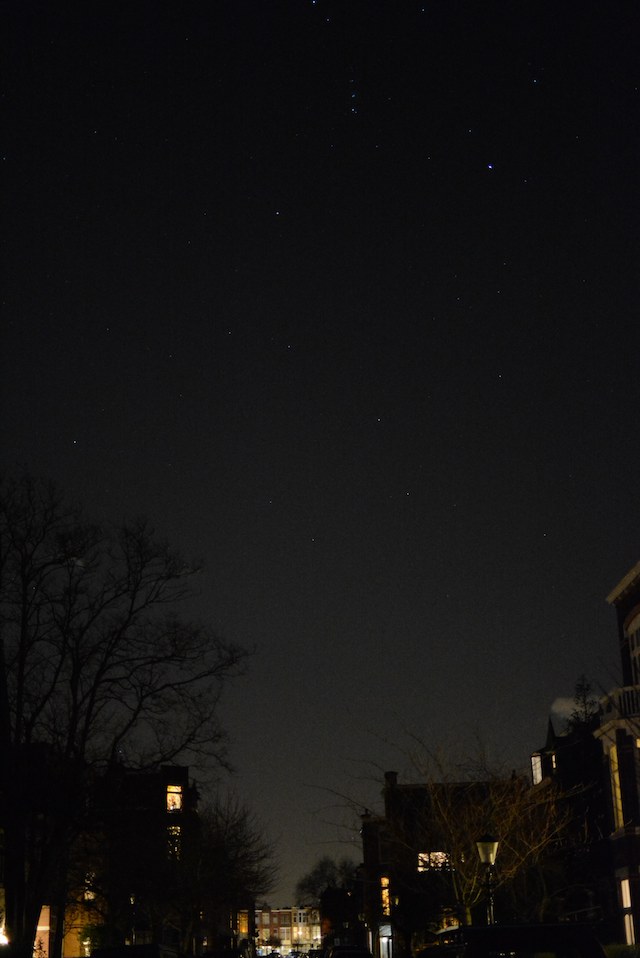
De straatverlichting in een deel van het Haagse Regentes-Valkenbos deed het vanavond niet, waardoor je goed de sterren kon zien.
Read the article - posted 2014-02-21
This is a post about the aspects of DSLRs in general and the Nikon D7100 in particular that those of you who haven't used a modern digital single lens reflex camera may not know about.

My new Nikon D7100 has a 24 megapixel sensor. I shot some test photos at 24, 13.5 and 6 megapixels with low, medium and high compression to see what the tradeoff between image quality and file size is. Have a look at the results.
Read the article - posted 2014-02-23
I originally planned to get a D3200 or a D3300, which are part of Nikon's entry level DSLR lines. But I couldn't resist the extra features that are part of the more advanced D7100. One of those features is that you can use very old lenses that don't have a built-in CPU. So with a small adapter ring, I was even able to mount my 35-year-old (give or take a few years) Pentacon 135/2.8 135 mm f/2.8 lens, also known as the "bokeh monster".
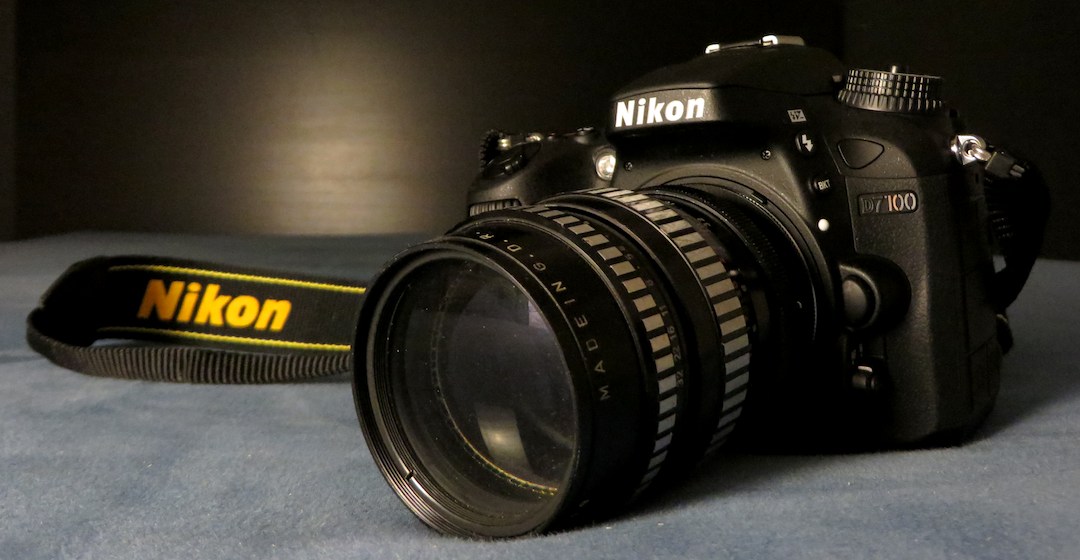
Although the number of top 100 websites that have IPv6 enabled has stagnated since World IPv6 Launch, the number of users that have the new protocol enabled keeps growing nicely: during the weekends, now 3% of Google's users have IPv6 according to the search company's IPv6 adoption statistics. (It's a bit lower during the work week, probably because more people have IPv6 at home than at work.)
And for the first time I saw a country pushing past 10% IPv6 adoption. Which country? Belgium!
Good work, guys.
Permalink - posted 2014-02-25
As you may know by now, there's an oil rig 12 km off the coast of The Hague. 12 kilometers is pretty far away, so it's not easy to photograph. Even with a long zoom lens it shows up pretty tiny:

How power-hungry are various permutations of Ethernet on modern MacBook Pros? Tests performed and written up by Jeroen van der Ham and Iljitsch van Beijnum.
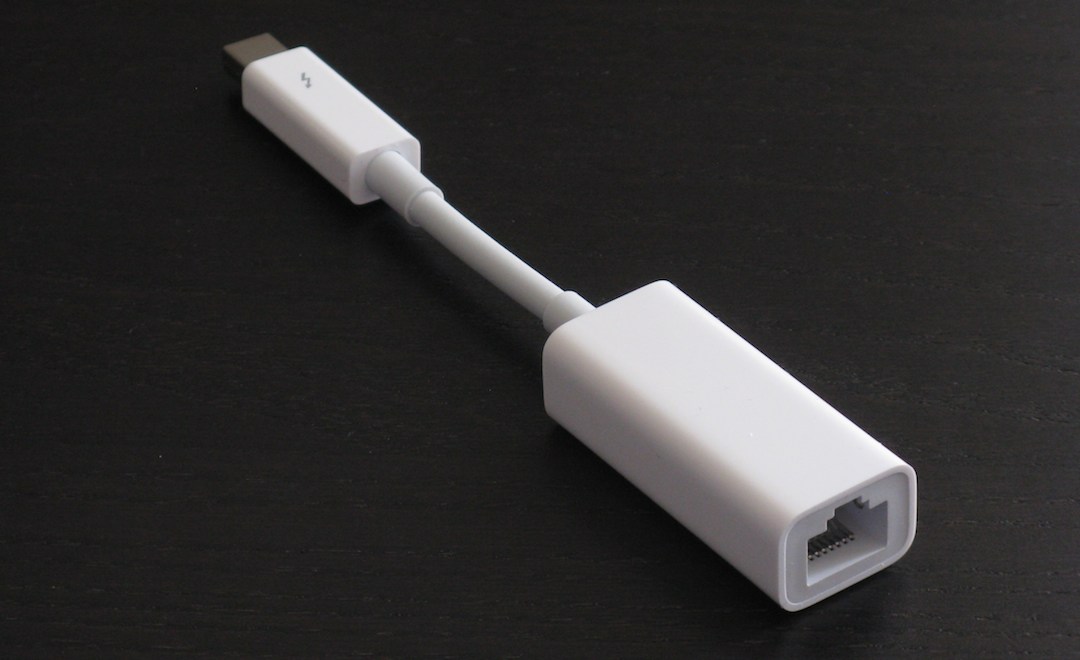
I have an old Philips 31CT "computer flash". No, it has nothing to do with computer memory—it's a flash unit that sits on top of your camera. And although calling it a computer grossly overstates matters, but it has a small amount of automation built in that allows the flash to measure the amount of light returning from the scene that's being illuminated, and actually stop flashing mid-flash once a proper exposure has been accomplished.
Read the article - posted 2014-03-05
After yesterday's experimentation with my old "computer" flash unit, someone on the dpreviews forums suggested that maybe I was getting bad exposures because the flash was a bit too slow for the D7100's 1/250 sync speed. So I set up a little still life to take some more test shots.
Read the article - posted 2014-03-05
When Nikon announced the D3300 camera along with a new version of the 18-55 mm entry-level kit zoom lens, I got somewhat excited. One of the things that I don't like about DSLRs is that they're so big and heavy. So having an even smaller and lighter version of Nikon's already smallest and lightest zoom lens really appealed to me.
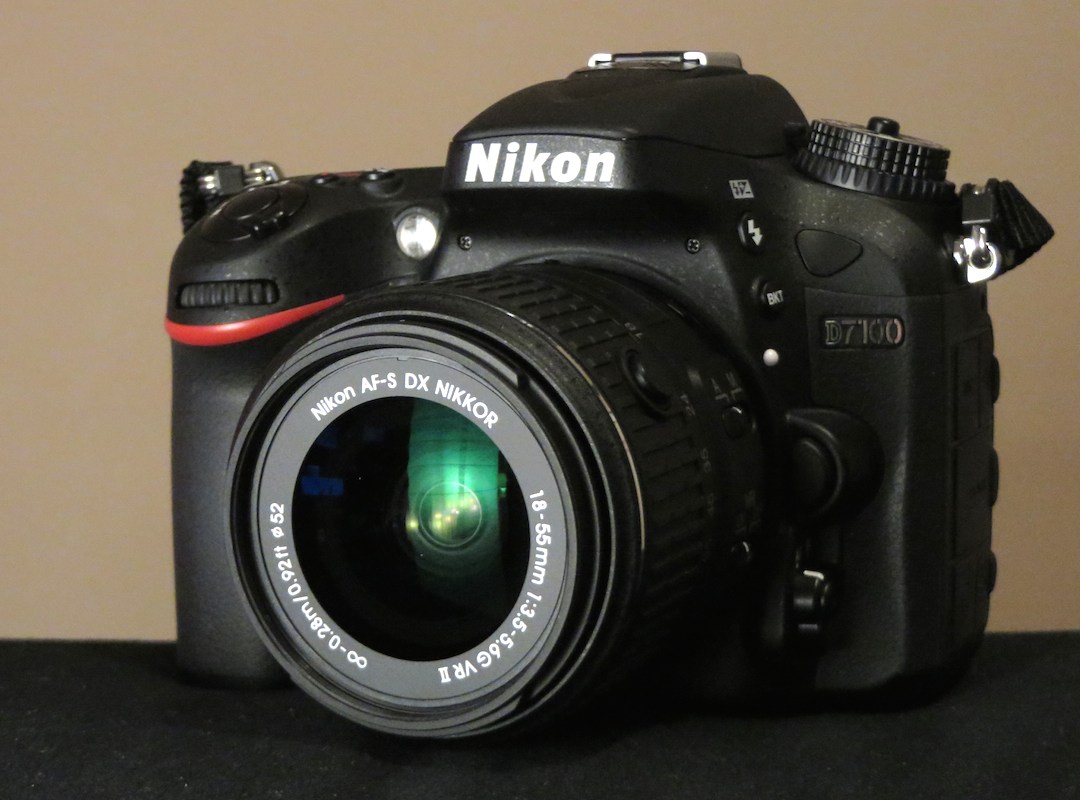
Image link - posted 2014-03-10
Great TEDxTalk video. As expected, what's sold as the "paleo diet" today has very little to do with how paleolithic people actually ate.
Also, it's important to remember that even with all the issues we have today, we still live longer than any previous generation, so how does it make sense to start eating like people who all died much younger than we do today? Not to mention that it's probably impossible and certainly not a good idea for our environment for 7 billion humans to eat enormous amounts of meat.
Read the article - posted 2014-03-14
Image link - posted 2014-03-15
Op Teletekst stond ineens dat het oude CBS-gebouw in Voorburg afgebroken gaat worden.
Mooie reden om er nog snel even een paar foto's van te maken.
Read the article - posted 2014-03-16
Today we had city council elections in the Netherlands. In an effort to stave off historically low turnouts (predictions were less than 50%) many cities use various gimmicks to attract voters. Here in The Hague it was possible to vote in a historic bus and a historic tram (streetcar), 50-year-old PCC. I went out to take some photos and a video. The first ones were at the kerkplein ("church square") where the stemtram (voting streetcar) looked a bit lost between the old, big church and the old city hall building (with the tower), especially as there were all kinds of trucks parked around the church, apparently there's a big event there.
In Den Haag had de gemeente een historische stembus en stemtram ingezet om kiezers te lokken. De stemtram is een PCC uit 1964. Ik was als eerste gaan kijken en wat foto's maken op het kerkplein, waar de stemtram er een beetje verloren bij stond tussen de grote kerk en het oude stadhuis, vooral ook omdat er allemaal vrachtwagens stonden om blijkbaar een evenement in de grote kerk op te bouwen.
Read the article - posted 2014-03-19
Earlier, I posted a video filmed with my Nikon D7100 DSLR.
The video came out pretty good, although it's rather boring and I really should be even more careful making sure m tripod is level. However, the D7100 is pretty useless for video.
Read the article - posted 2014-03-19
When I heard about navy ships patrolling the coast off of The Hague during the Nuclear Security Summit I was expecting bigger ships... From the beach I couldn't even tell whether this was a navy ship or a yacht, especially because it's so bright white. But the canon on the front deck kind of gives it away.

And of course I included my favorite photographic subject, the oil rig.
Permalink - posted 2014-03-23
I just love this story on Ars Technica by Megan Geuss: Wikipedia founder calls alt-medicine practitioners “lunatic charlatans”.
Read the article - posted 2014-03-26
Het is alweer negen jaar geleden dat mijn boek over IPv6 uitkwam. Had je me destijds gevraagd of in maart 2014 in België 15% van de eindgebruikers IPv6 zou draaien, dan had ik vast "ja, tuurlijk" gezegd. En ruim 6% van de Amerikanen? Vast wel, daar hebben ze nog zoveel IPv4, die hebben minder haast. Maar dat het in Nederland maar 1,1% is en in China zelfs iets minder dan 1%? Nee, dat zou ik niet gedacht hebben. Nederland was tien jaar geleden immers een Europese voorloper op IPv6-gebied, en iedereen wist dat Azië het beloofde IPv6-land was. Vreemd hoe die dingen kunnen lopen.
Read the article - posted 2014-03-30
Image link - posted 2014-04-14
I've been reading up on nutrition the past year and a lot of the articles and videos you find online espouse the notion that natural is good and processed is bad. This article in The Atlantic by David Freedman from almost a year ago makes a compelling case that it's the (fast) food industry that could help give us healthier food with more high tech food engineering rather than less.
Read the article - posted 2014-04-16
Reading Bruce Schneier's blogpost on the heartbleed bug:
❝I'm hearing that the CAs are completely clogged, trying to reissue so many new certificates. And I'm not sure we have anything close to the infrastructure necessary to revoke half a million certificates.❞
Wouldn't it make sense to simply invalidate update SSL implementations to reject all certificates that predate the discovery of the heartbleed vulnerability? Even if all the the potentially compromised certs are added to revocation lists, most clients don't check for revoked certificates, leaving a huge opportunity for man-in-the-middle attacks using the compromised certificates.
Permalink - posted 2014-04-18
Image link - posted 2014-04-20
Image link - posted 2014-04-26
It's official: for all intents and purposes, North America is out of IPv4 addresses. Two of the four other regions have been in that situation for some time, and Latin America will be joining North America, Europe and Asia in about a month. That leaves Africa, which still has almost 50 million IPv4 addresses, which are used up at a rate of 5 - 10 million a year.
Does this mean that if you're running a business that requires a regular infusion of new IP addresses, it's time to relocate to Africa?
Read the article - posted 2014-04-28
The video is 2 minutes long.
Read the article - posted 2014-04-30
Yes, it's 2014. Using IPv6 sockets is no big deal.
Read the article - posted 2014-04-30
The other day I had a discussion about whether to use the "standard" sRGB color space or a larger color space for my digital photos.

Today, May 6th, is International Day Against DRM. Digital Rights Management restricts what you, the consumer, can do with the digital content you buy. In the beginning it doesn't seem so bad, but then a device breaks and it turns out you can't take your content with you on a different device. But I especially worry about forgotten content in the future that will stay forgotten in the future as it's locked down by long forgotten DRM schemes. Read all about it at defectivebydesign.org.
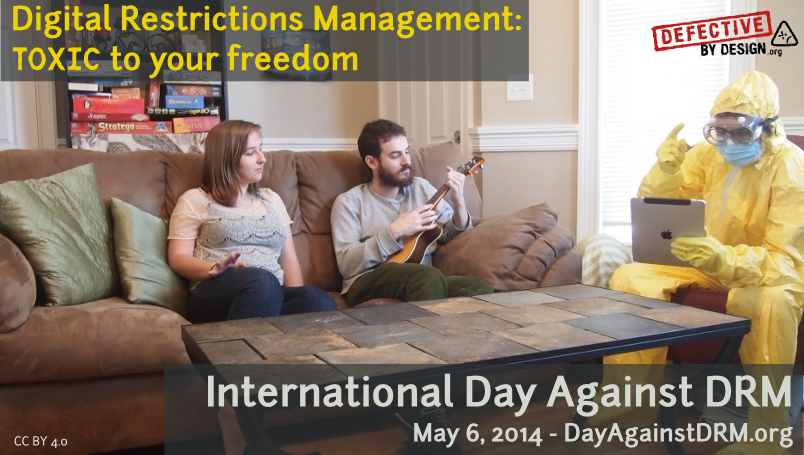
Ook ARIN, de instantie die in Noord-Amerika IP-adressen uitdeelt, is door z'n normale voorraad IPv4-adressen heen. IP-adressen worden uitgedeeld door vijf regionale internetregistreerders (RIRs), waarvan APNIC, wat Azië bedient, drie jaar geleden als eerste door z'n voorraad IPv4-adressen heen was. Het Europese RIPE NCC volgde anderhalf jaar geleden, en vorige week was het de beurt aan het Noord-Amerikaanse ARIN. LACNIC (Latijns Amerika en de Cariben) volgt naar verwachting over een maand. Dan blijft over het Afrikaanse AfriNIC, dat nog bijna 50 miljoen IPv4-adressen in voorraad heeft, die met 5 tot 10 miljoen per jaar uitgegeven worden.
Betekent dit dat degenen die een bedrijf runnen dat afhankelijk is van een regelmatige toevoer van nieuwe IP-adressen nu maar naar Afrika moeten verhuizen? Hopelijk niet.
Read the article - posted 2014-05-06
If you have any interest at all in using older Nikon lenses, you probably have some understanding of the difference between non-AI, AI, AI-S, AF and AF-S lenses. The trouble is that places on the web that explain the differences easily get lost in the details. This article is intended to serve as a slightly easier to digest version of the story.
Read the article - posted 2014-05-08
Image link - posted 2014-05-10
I started taking photos in the 1980s. I still have a bunch of black-and-white negatives that I developed myself, but never got them printed. In addition to that, I have color photos with their negatives and slides. The past years, I've been looking for a way to digitize all of these. The number of photos isn't huge, maybe a few hundred, but having a service do it at 50 cents or so quickly adds up. Turns out that some flatbed scanners have a transparency attachment so you can scan negatives and slides. The Epson Perfection V370 Photo scanner has a transparency mode built in. It gets pretty good reviews and only costs about € 80 or $100. So I got one.
Read the article - posted 2014-05-17
In order to sync an iPhone running iOS 7 with your Mac you need to run iTunes 11.1. The combination of MacOS 10.9, iTunes 11.1 and iOS 7 will no longer sync calendars and contacts between a Mac and an iOS device directly over USB or Wi-Fi: the only way to do this is using iCloud or other CalDAV and CardDAV servers.
Read the article - posted 2014-05-20
Good piece on the misguided efforts to get adults to wear helmets when riding a bicycle.
Here in Holland adults on regular bikes (as opposed to racing bikes) virtually never wear helmets. I've never heard of anyone falling off of their bikes on their heads.
I've cycled 8000 km last year myself, and I can think of very many things that would make the roads safer for cycling, the first of which would be to, you know, look at the traffic around you. Helmets would be very far down the list.
I got some flack for always listening to podcasts or music when cycling, but I don't think that's a problem. I keep the volume low enough that I can still hear car horns and I'm very careful about looking in all directions, including behind me, which many cyclists don't. I had two minor collisions the past year, in both cases because another cyclist turned left unexpectedly as I was passing them.
Read the article - posted 2014-05-20
It's only been about seven months since Apple released OS X 10.9, the latest and greatest version of its Mac operating system. But the yearly upgrade cycle means that unless something unexpected happens, Apple will tell us about OS X 10.10 at the traditional keynote next month on the first morning of its Worldwide Developers Conference (WWDC). The operating system is over 13 years old and it's come a long way since those first versions, but it's still not perfect. What areas do we think Apple should focus on in 10.10?
Read the article - posted 2014-05-20
Image link - posted 2014-05-22
Image link - posted 2014-05-24
Vorige week passeerde ik De Affiche Galerij, een enorme vitrine in de tramtunnel onder het Spui in het centrum van Den Haag waar het Gemeentearchief een aantal keer per jaar een tentoonstelling samenstelt.
Tot 6 juli hangt er de tentoonstelling 150 jaar tram in Den Haag. Het blijkt dat er ook een boek en een film over dit onderwerp zijn.

Image link - posted 2014-06-05
Image link - posted 2014-06-08
If you haven't seen this TED talk, go do that first: The paradox of choice by Barry Schwartz. Schwartz is a psychologist who talks about how having more choice isn't always a good thing.
This applies to networking, too. If you have a router connected to (say) two ISPs with BGP, for every destination on the internet, your router now has to decide whether to send packets over ISP A or ISP B. If your router consistently makes the right choice, you're better off than someone who is only connected through one ISP. But if your router consistently (or just mostly) makes the wrong choice, your performance will actually be worse than someone connected through one ISP!
Unfortunately, the BGP protocol has a very limited notion of what is best. This means that in practice, it's a good idea to not leave BGP to its own devices, but rather check whether your router(s) at the very least avoid underperforming paths. However, this can be a lot of work.
An alternative is to use a system that automatically optimizes routing performance, such as the Noction Intelligent Routing Platform
Read the article - posted 2014-06-10
Long text version of Maciej Cegłowski's talk, but trust me, you need to read the whole thing, and not just for the cute animal photos.
Read the article - posted 2014-06-10
Today LACNIC, the registry that gives out IP addresses in Latin America and the Caribbean, effectively ran out of IPv4 addresses, like their colleagues in Asia, Europe and North America before them. Only AfriNIC in Africa is still providing the IPv4 addresses in the amounts ISPs request.

Read the article - posted 2014-06-10
My Ars Technica story about ARIN and LACNIC running out of IPv4 addresses.

Read the article - posted 2014-06-12
Since I got back in the SLR game, I got some additional second hand cameras and lenses. As a result, I'm now the owner of no fewer than five 50 mm lenses. (Well, four 50 mm and one 55 mm.) So I decided to compare them. First an overview, then some testing!
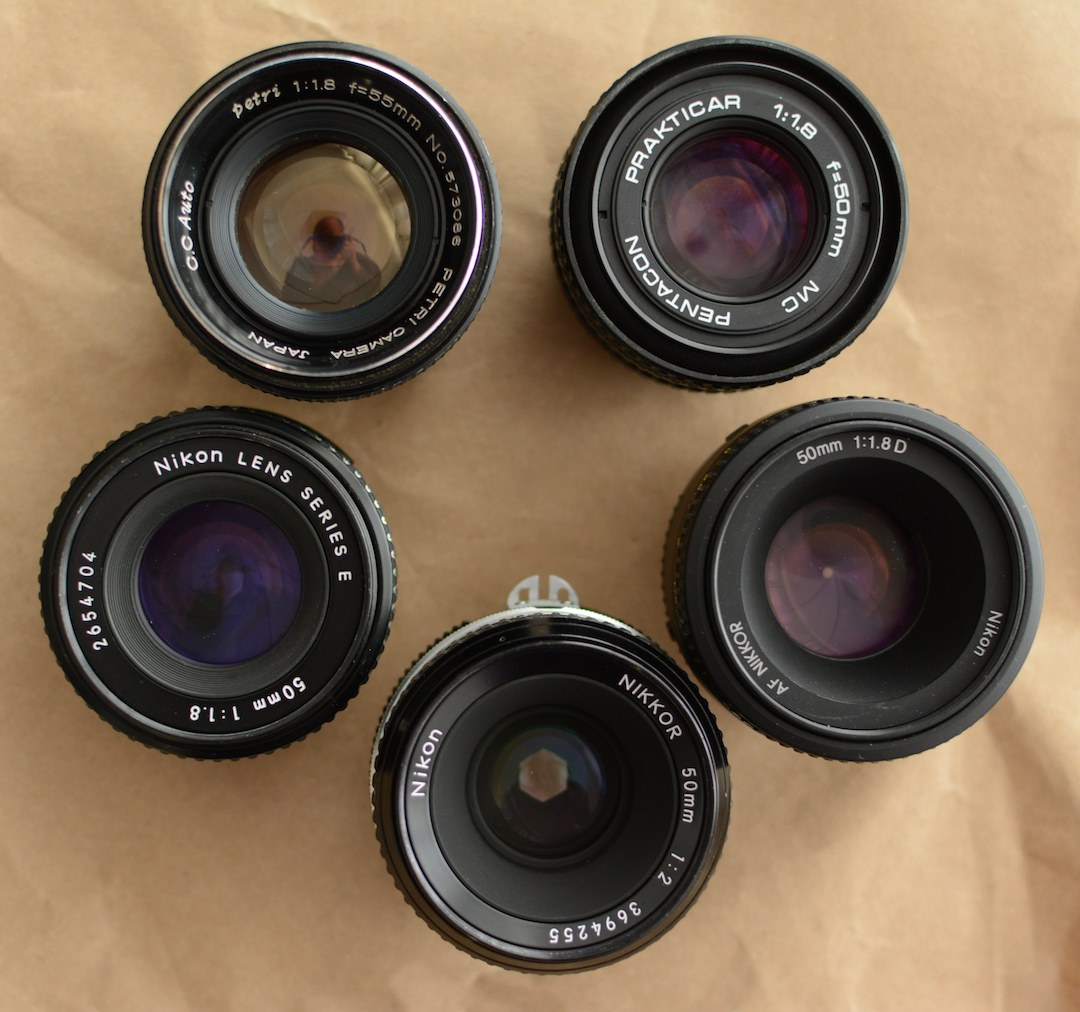
Twee maanden geleden kondigde ARIN aan dat ze nu in “fase 4″ van de IPv4-uitgifte zitten. Er is geen fase 5. Hoewel de regels iets anders zijn, zit Noord-Amerika nu dus in dezelfde situatie als waarin APNIC (Azië/Australië) zich al drie jaar bevindt en het RIPE NCC (Europa) bijna twee jaar: ISPs en andere gebruikers van IP-adressen kunnen niet langer zoveel IPv4-adressen krijgen als ze nodig hebben. En vorige week voegde LACNIC (Latijns Amerika en de Caraïben) zich bij de club. IPv4-adressen zijn nu dus alleen nog in Afrika makkelijk te krijgen. Wat twee vragen opwerpt: waar zijn al die IPv4-adressen gebleven, en wat nu?
Read the article - posted 2014-06-17
Earlier this week I got myself a Nikon F65 camera. The F65 is a single lens reflex 35 mm film camera that Nikon sold from 2001 to around 2005. You can get these second hand for next to nothing these days...
Read the article - posted 2014-06-19
Yesterday was Architecture Day (Dag van de Architectuur) in The Netherlands. One of the activities for DvdA The Hague was tours of several bunkers in the dunes that were part of the Atlantikwall during WOII, organized by the Atlantikwall Museum Scheveningen.
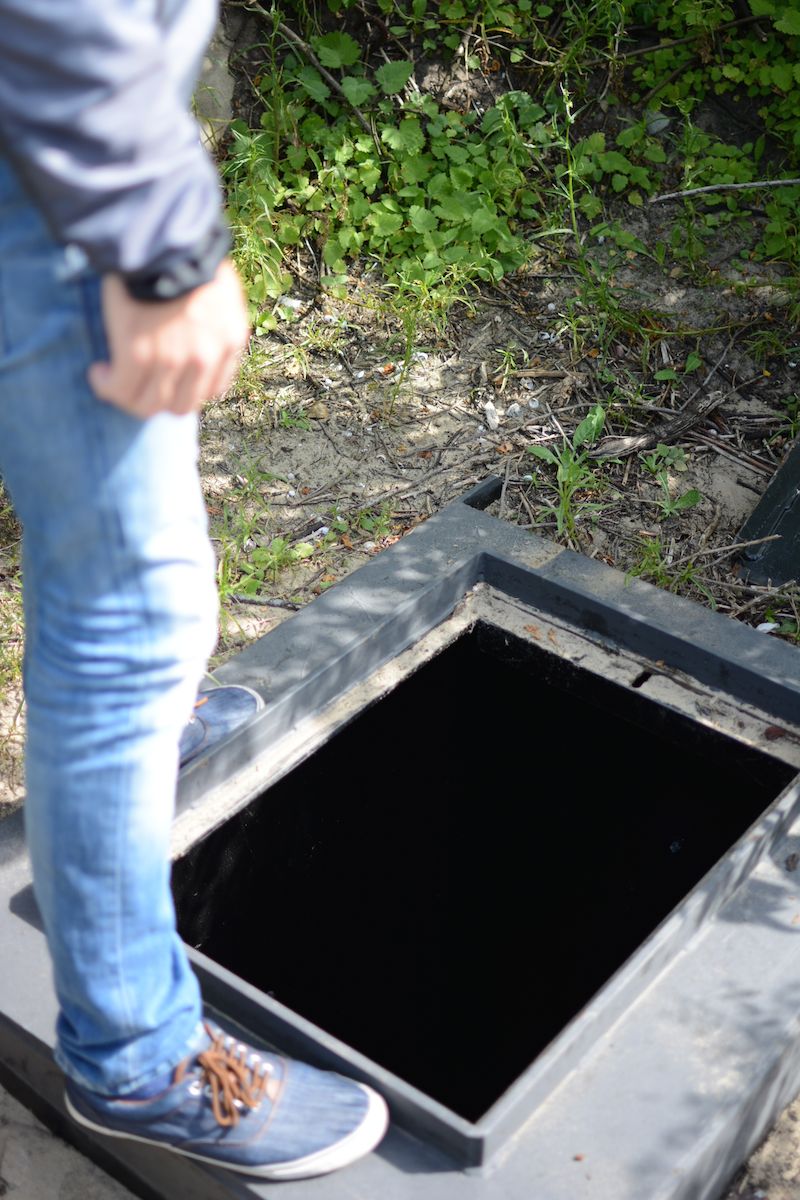
Last week, I wrote a review of the Nikon F65 camera. Although the F65 is more than a decade old, it supports most of the photographic automation that we're used to with our digital cameras. The F65 left me wanting to go even further back in time, so this week I'm going to explore manual focus photography with a Nikon FE SLR and Nikon AI and AIS lenses on my current Nikon D7100 digital camera.
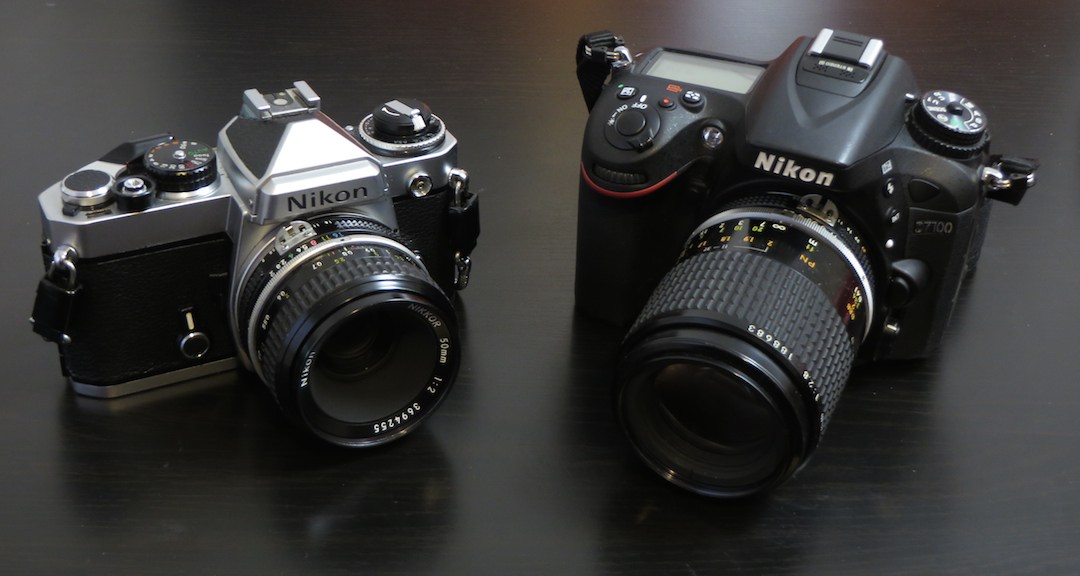
Image link - posted 2014-06-27
A couple of months ago I bought a Micro-NIKKOR 105mm 1:2.8 manual focus macro lens. Today I went for a nice long walk just outside the city and got some use out of this lens.
Read the article - posted 2014-06-28
At the February NANOG meeting, Geoff Huston talked about BGP in 2013. For a quarter of a century, there have been concerns about BGP hitting scalability issues. The Internet Architecture Board even organized a meeting to discuss the issue in 2006. However, Geoff argues that the current growth is not presenting any immediate problems: "Nothing in BGP looks like it's melting".
Read the article - posted 2014-06-30
A few weeks ago, I wrote With the Americas running out of IPv4, it's official: The Internet is full for Ars Technica, where I explain where all the IPv4 addresses went.
 In the comments, a reader posted a link to an interview with Vint Cerf where Cerf explains how we ended up with the limited 32-bit IPv4 address space. Well worth a listen. The 32-bit thing starts 26 minutes in. Basically, IPv4 is the test version of IP, and IPv6 is the production version!
In the comments, a reader posted a link to an interview with Vint Cerf where Cerf explains how we ended up with the limited 32-bit IPv4 address space. Well worth a listen. The 32-bit thing starts 26 minutes in. Basically, IPv4 is the test version of IP, and IPv6 is the production version!
Image link - posted 2014-07-05
Or maybe they're dual stack and the display simply isn't big enough to show the IPv6 address?
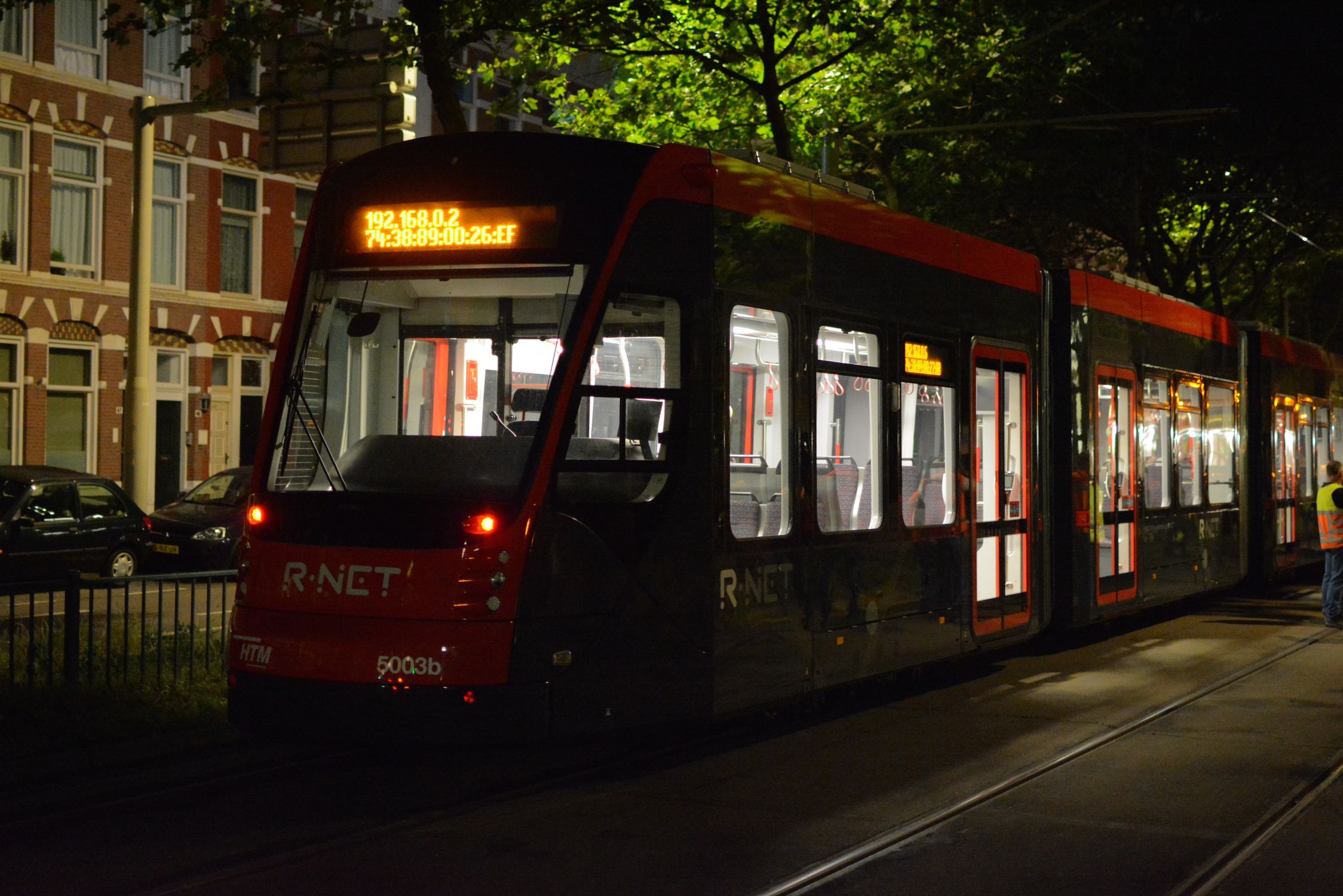
Yesterday in the middle of the night, the first of the new Siemens Avenio trams was delivered, just in time for the unveiling after the parade of old trams celebrating 150 years of trams in The Hague. Click to show the full article with 15 more photos of the Avenio delivery and the tram parade; captions are in Dutch.
Read the article - posted 2014-07-05
Image link - posted 2014-07-07
Image link - posted 2014-07-09
Hoewel ik het na de drukte van vorige week eigenlijk wel gezien had voorlopig, kon ik het toch niet laten om gister nog wat plaatjes van oude trams te schieten, maar nu zit wat mij betreft het oudetramfotografieseizoen er wel op.
De reden om toch gister nog op pad te gaan met de camera is dat er nu oude trams over de route van lijn 9 reden, wat bij de normale ritten op zondagmiddag niet gebeurt. En de route van lijn 9 wordt binnenkort onder handen genomen om er straks de bredere Avenio's (zie foto's vorige week) over te kunnen laten rijden. Dus misschien was dit wel de laatste kans om de oude gele PCC's te zien rijden als lang geleden toen ik met tram 9 naar school ging.

I've been experimenting with shooting film a bit recently, which gives me that nice retro feel. And nothing is more retro than shooting black-and-white film. So let's compare the results to the black-and-white images current cameras produce.
In addition to using some classic Ilford HP5 film (well, Ilford HP5 Plus these days), which is very similar to Kodak Tri-X, I also wanted to try out some chromogenic film. Chromogenic film is black-and-white film that is developed using the same C41 process that is used to develop regular color negatives, so you can have it processed pretty much anywhere.

I've been teaching BGP training courses for more than ten years now. Shortly after my BGP book came out, I teamed up with NL-ix, the operators of the neutral internet exchange, to teach the people connecting to NL-ix (and anyone else interested) about BGP. What makes our training course unique is that we don't just cover the theory, but also have people configure BGP on a Cisco router, where they have to set up peerings toward the other participants.
When we added an IPv6 training course, the content was based on my IPv6 book, which didn't really lend itself to the same approach because it covers a much wider range of topics: enabling IPv6 on various operating systems, routing, tunnels, DNS, applications, security. I was never really happy doing just theory with no hands-on part. So I decided to focus more on routing with the IPv6 training course, and include tunnel, OSPF, BGP and DHCPv6 assignments so the participants can get some hands-on experience with the new protocol. As always, there were a few surprises when participants were trying to do the assignments for the first time, but the new format was a success.
If you're interested in one of these training courses (or both), the next dates are October 6 for the BGP course and October 7 for the IPv6 routing course. The location is the NL-ix office in The Hague, and the language will be English unless all participants speak Dutch. (The next time after October the language will be Dutch.) See the NL-ix training course page for details and the sign up form.
Permalink - posted 2014-07-16
Een deel van de lezers van ISP Today zal wel eens naar een RIPE meeting geweest zijn, waar medewerkers van ISPs en internet-experts van verschillend pluimage bij elkaar komen om het wel en wee van het internet te bespreken. In Amerika vervullen de bijeenkomsten van de North American Network Operators Group (NANOG) een soortgelijke functie. Een bekend gezicht bij zowel RIPE als NANOG is Geoff Huston, Chief Scientist van APNIC, de Aziatisch/Australische tegenhanger van RIPE.
Op de NANOG-meeting in februari presenteerde Geoff "BGP in 2013", een overzicht van hoe het Border Gateway Protocol ervoor stond vorig jaar.
Read the article - posted 2014-07-17
Ik geef nu al ruim tien jaar BGP-cursussen. Kort nadat mijn BGP-boek uitkwam begon ik een samenwerking met NL-ix, de neutrale internetexchange, om mensen die een NL-ix verbinding namen (en andere geïnteresseerden) BGP te leren. Wat onze cursus uniek maakt is dat we niet alleen de theorie behandelen, maar ook de deelnemers zelf BGP laten configureren op een Cisco-router, waarbij ze peerings met de andere deelnemers moeten opzetten.
Toen we de IPv6-cursus gingen doen was die gebaseerd op mijn IPv6-boek, wat zichzelf niet echt leent voor dezelfde aanpak omdat het een veel groter aantal onderwerpen behandelt: IPv6 activeren op verschillende besturingssystemen, routering, tunnels, DNS, applicaties, beveiliging. Maar ik was niet echt gelukkig met alleen theorie doen zonder praktisch deel. Zodoende besloot ik om de cursus meer te richten op routering met daarbij opdrachten over tunnels, OSPF, BGP en DHCPv6, zodat de cursisten zelf aan de slag kunnen met IPv6. Zoals altijd waren er wat verassingen toen de deelnemers voor het eerst de opdrachten deden, maar de nieuwe opzet was een succes vorige maand.
Read the article - posted 2014-07-18
I've been doing a lot of reading and Youtube watching about nutrition the past year or so. So I've seen all the scary numbers about the increasing obesity levels in the United States (and elsewhere) numerous times¹, and seen all the speculation about the reason why Western populations started getting so much heavier the past decades.
Read the article - posted 2014-07-29
❝The short version is that essentially anything you've backed up to or stored on iCloud is available for Apple to fork over to law enforcement, including connection logs and IP addresses you've used. Apple has access to 60 days of iCloud mail logs that "include records of incoming and outgoing communications such as time, date, sender e-mail addresses, and recipient e-mail addresses"; any e-mail messages that the user has not deleted; and any other information that can be backed up to iCloud. As of this writing, this list includes contacts, calendars, browser bookmarks, Photo Stream photos, anything that uses the "documents and data" feature (which can include not just word processors but also photo and video apps, games, and data from other applications), and full device backups.❞
Read the article - posted 2014-07-31
Image link - posted 2014-08-01
Told you so.
Read the article - posted 2014-08-06
Nog twee nachtjes slapen!
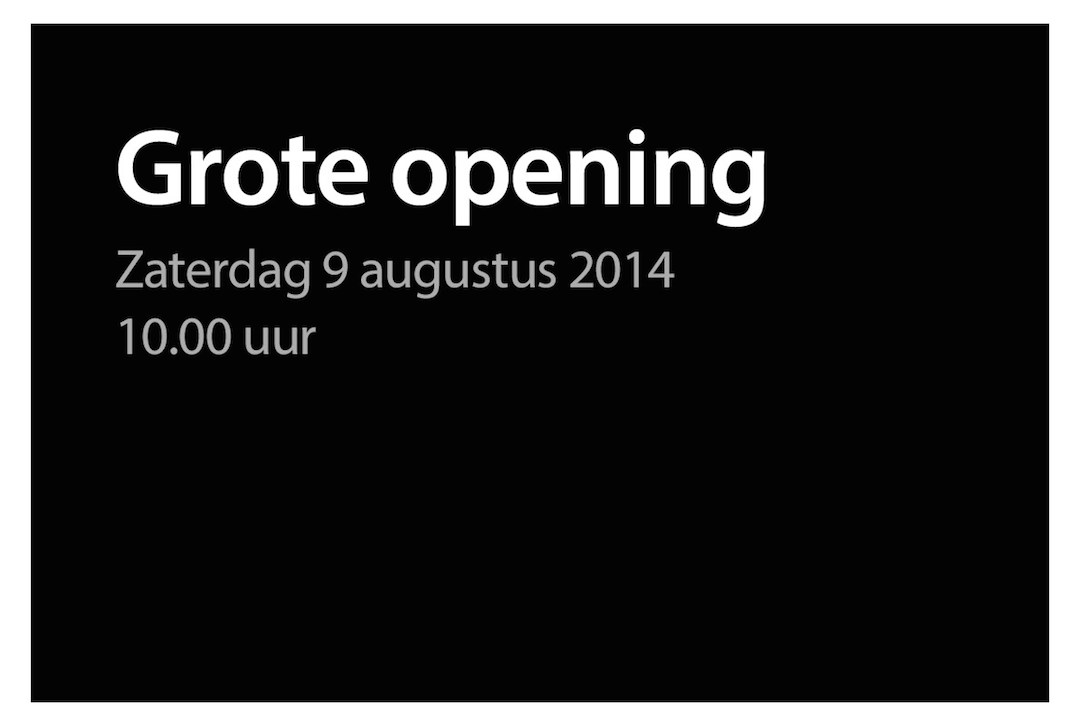
En blijkbaar heb je daar een survivalgids voor nodig...
Read the article - posted 2014-08-07
Image link - posted 2014-08-08
Image link - posted 2014-08-19
Het is nooit een goed tegen wanneer de gewone pers schrijft over een BGP-gerelateerd probleem, zoals vorige week: Omvangrijke storing internet legt websites wereldwijd plat (de Volkskrant). Het probleem is dat de BGP-tabel de FIB-limiet van 512k in sommige oudere routers bereikte. Een flink aantal onbereikbaarsheids- en vertragingsproblemen werden aan het routerprobleem gekoppeld, maar het is niet duidelijk in hoeverre dat terecht is.
Read the article - posted 2014-08-19
It's never a good sign when the regular press reports about BGP-related issues, such as last week: Browsing speeds may slow as net hardware bug bites (BBC). The problem is that the BGP table has started to hit the 512k FIB limit in some older routers. Numerous outages and slowdowns were reported to be caused by this, but it's unclear to which degree that's accurate.
Read the article - posted 2014-08-19
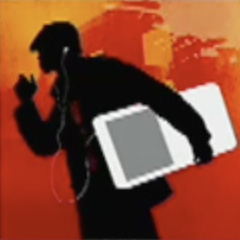 It looks like the introduction of the iPhone 6 is only a few weeks away. And if the rumors are to be believed, it's going to be bigger than the iPhone 5/5S/5C. People talk about 4.7 inches vs 4 inches for the iPhone 5 family, which I'll take as 12 cm vs 10 cm—a 20% increase.
It looks like the introduction of the iPhone 6 is only a few weeks away. And if the rumors are to be believed, it's going to be bigger than the iPhone 5/5S/5C. People talk about 4.7 inches vs 4 inches for the iPhone 5 family, which I'll take as 12 cm vs 10 cm—a 20% increase.
But what about the screen resolution? 1136 x 640, 1364 x 768, 1280 x 720 or 1920 x 1080? ...
Read the article - posted 2014-08-21
Tonight is the third night of the Scheveningen International Fireworks Festival! Hopefully the rain will be done by then. Photographing fireworks remains tricky business, though.
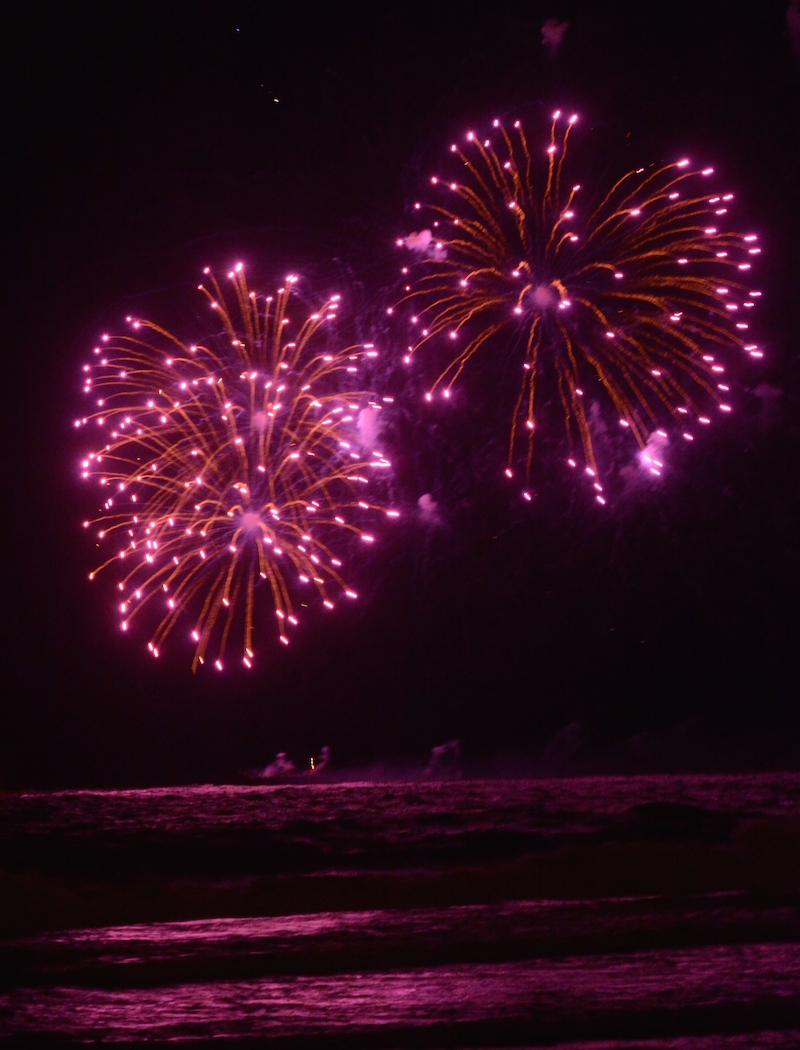
That was fast. No sooner had I complained about my iPhone 5 battery:
❝When I got my iPhone 5, I did a bunch of battery tests, and at that point, the battery life was pretty much identical to that of my iPhone 4, which was two years old by then. However, pretty soon I started having issues where the phone would shut down if I tried to do too much at the same time if the battery was below 50%, especially in cold weather. (Taking a photo would typically do it, as that fires up the GPS which in turn causes cellular data traffic.) It took me a while to figure out that five minutes later, I could turn the phone back on. These days, I have to be very careful with the way I use my iPhone in order to make it last through the day on a single charge.❞
...or Apple announces the iPhone 5 Battery Replacement Program!
Read the article - posted 2014-08-23
Vandaag hield het Haags Openbaar Vervoer Museum weer z'n tweejaarlijkse PCC-dag.

Many people's first take on the iPad was that "it's just a big iPod touch". And so it is, really. But sentiments changed quickly as sales numbers skyrocketed: the king (the computer) is dead, long live the new king (the iPad). But then iPad sales numbers went down for two consecutive quarters. While Mac sales were up.
There are of course many possible explanations: iPads aren't upgraded biennially like phones, but rather every three years or longer. Apple's prices are too high. Competition from cheap Android tablets.
Software on the iPad doesn't seem to do very well, either, which has its own issues, but I think the real reason for lack of both hard- and software sales is that the iPad simply isn't as useful to as many people as industry watchers thought...
Read the article - posted 2014-08-25
Have you ever noticed how the iPad has strange screen sizes? 9.7 and 7.9 inches. The same for the rumored new iPhone sizes: 4.7 and 5.5 inches. Turns out some of these screen sizes are nice, round numbers... in the metric system.
Read the article - posted 2014-08-26
After six years of using one, it's not often that I stumble upon an iPhone trick I didn't know before. But here's one. When looking at the lock screen when audio is playing, press the home button and the audio controls are replaced with the large clock that the lock screen normally shows when no audio is playing.
Read the article - posted 2014-08-27
Last week a SIGCOMM paper was published with a bunch of IPv6 measurements in it, which concludes that IPv6 deployment is getting real. For instance, 0.6% of internet traffic was IPv6 at the beginning of 2014, which is 5 times more than in 2013 and that 5 times more than in 2012. Click the link to read my story about this on Ars Technica.
Read the article - posted 2014-08-28
Yesterday I posted this to Twitter:
❝Kicking it old school while my iPhone 5 is undergoing battery surgery.❞
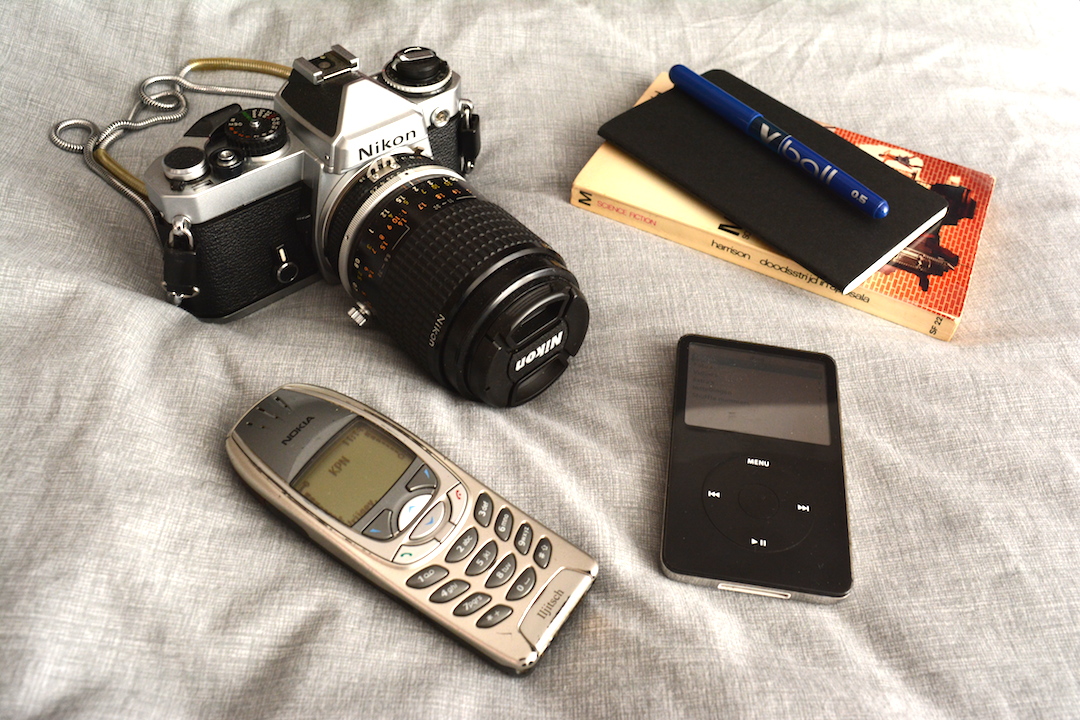
And then this morning I saw Andy Ihnatko had a video based on a similar photo...
Read the article - posted 2014-09-02
❝There's nothing new tablets can offer existing owners.❞
Op-ed by Peter Bright on Ars Technica on why tablets aren't selling like they used to. Couldn't have said it better myself.
Read the article - posted 2014-09-04
Next week I'm doing a guest lecture about the infrastructure of the internet. Turns out that I already talked about that in 2003 (PDF). One slide in that presentation caught my eye:
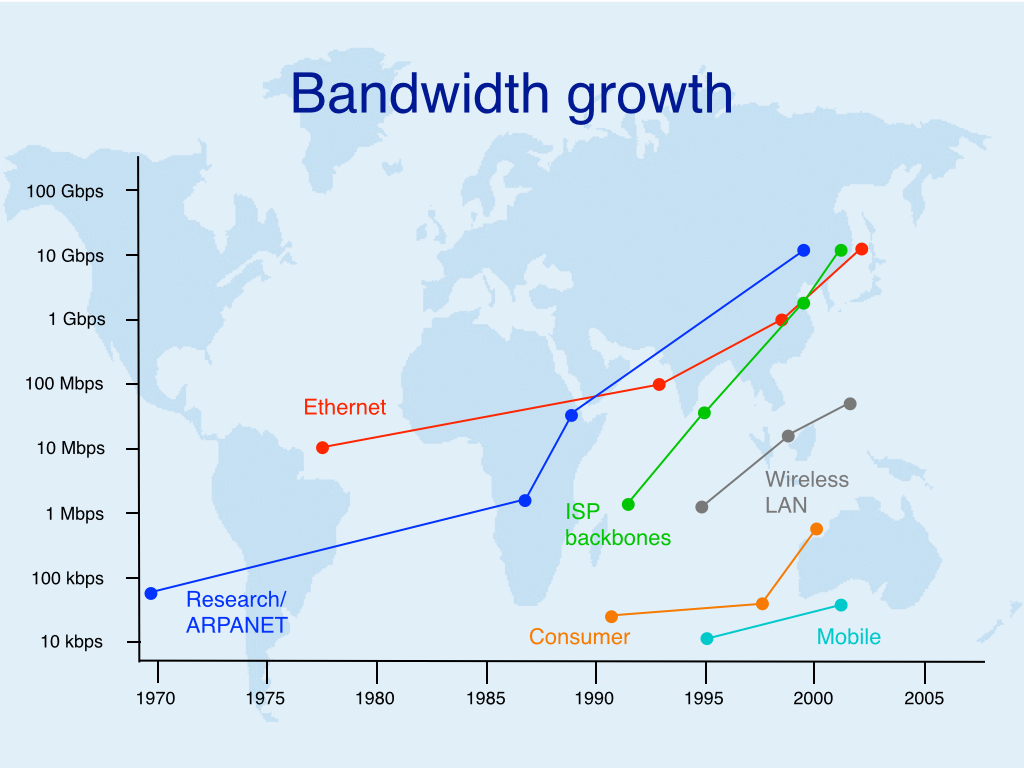
The image shows how bandwidth in research networks and ISP networks has grown, as well as the bandwidth provided by technologies such as Ethernet, Wi-Fi, mobile data, and consumer internet access. All of them show a healthy growth, although some start from extremely modest beginnings.
So I wondered what happened in the intermediate decade...
Read the article - posted 2014-09-04
NFC is an amazing technology. Mark my words: it's going to be huge. Whether Apple adopts it next week or not. The reason: it ties together the physical world with the networked world. When scanning for Wi-Fi networks or bluetooth devices, it's really hard to know which names on your screen map to which devices in the real world. So Wi-Fi requires typing long and complex network passwords and bluetooth uses an annoying pairing procedure. NFC, on the other hand, really is plug and play. Without the "plug" part.
Read the article - posted 2014-09-07
Image link - posted 2014-09-08
Here's my predictions regarding tomorrow's expected iWatch announcement. I wrote this article nearly two years ago, but I feel it holds up just fine.
I even mention NFC. Having NFC in a watch or wrist strap would be very convenient when it comes to making contact with a reader, but unlike iPhones, I don't think an iWatch would have a fingerprint sensor, as there's no room to put one on the device. Well, on the strap maybe. And the fingerprint scanner is what would make NFC payments so much better than current payment systems.
Read the article - posted 2014-09-08
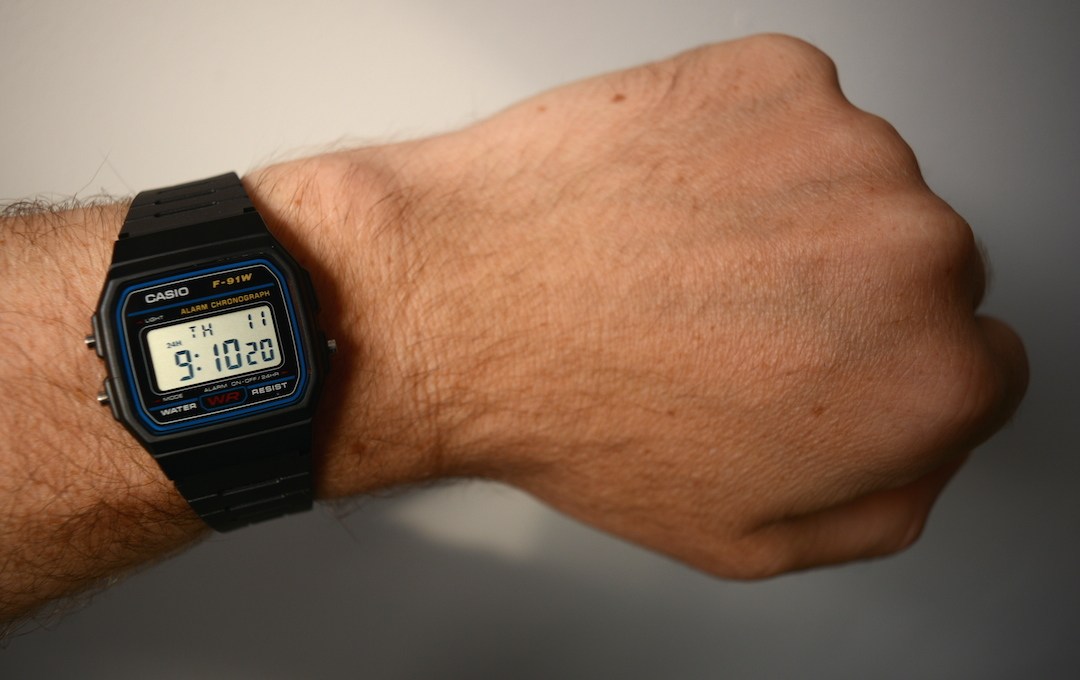
The Casio F-91W is a great watch. It's cheap (I paid 15 euros) and simple. It weighs 22 grams. The best thing? The battery life is seven years. Casio started making them in 1991, and they're still selling in good numbers, according to this somewhat incredulous story over at the BBC.
I do have to admit one of the reasons I got the F91W is to see if I could get used to wearing a watch again in anticipation of the Apple Watch.
Permalink - posted 2014-09-11
Eye-opening TED talk (19 minutes) by Hans Rosling and Ola Rosling. We may think the world is on fire, but in reality things have never been better. Don't be a Swede and stop being ignorant about the world we live in.
Read the article - posted 2014-09-14
I've pretty much decided to skip the iPhone 6 and stick with my iPhone 5 for another year. One of the new features in the iPhone 5 two years ago was LTE or 4G. But sadly, even though I kept my eye open for it when roaming internationally, I've never seen "4G" in the status bar of my iPhone 5.
After the Netherlands implemented net neutrality in 2012, prices for mobile data went up a lot, but I'm grandfathered into a cheap unlimited plan from KPN that I'd have to give up to get LTE. Also, KPN uses LTE frequencies that the iPhone 5 doesn't support, so I'd have to switch carriers.
So what I did instead was get a prepaid SIM from Vodafone NL...
Read the article - posted 2014-09-14
I was updating a presentation the other day, and I found something I wanted to share here. (Looks like old presentations are good blog fodder. Who knew.) The old presentation was the one I did at the 2013 ISOC New Year's event, where I put up some slides on Google's numbers of IPv6 users (from their vantage point) in various countries. That was less than two years ago, and a lot has changed.
The global number of IPv6-capable users was 1% then (January 2013), now (September 2014) it's 4%. Some countries that were ahead of the curve extended their lead, others didn't, and a new world leader emerged out of nowhere. Click the link to see the old slides followed by the current situation. (1.4 MB PDF.)
So the good news is that a lot can happen quickly when it comes to IPv6 deployment.
Read the article - posted 2014-09-15
I was thinking about v1.0 issues with the upcoming Watch (sorry, Apple Watch) myself. On the one hand it would be cool to have the very first instance of a new product category (from Apple). On the other hand, if you wat for the first or second refresh, you usually get something much better. Reading this Ars Technica article it's actually kind of scary how limited 1.0 versions of the iPod, MacBook Air, iPhone and iPad really were.
Food for thought.
Read the article - posted 2014-09-16
Image link - posted 2014-09-16
In iOS 7, lots of stuff turned white. Such as the Music application, which you use to play music. That's unfortunate, because the album art embedded in songs looks much better on a black background than it does surrounded by white. However, the lock screen, which also shows album art if music is playing, is still dark.
The problem here is that for non-square album art, the image is made square by "letterboxing" it with white borders on the sides or the top and bottom—a real eyesore (As far as I've been able to tell, art work for music on the iTunes store is always square and actual (vinyl) album art is also square. However, CD boxes aren't quite square.) Fortunately, we only had to suffer this indignity for a year, as the iOS 8 update released last week fixes this.
Read the article - posted 2014-09-21
So next month American iPhone 6 and 6+ users can start paying wirelessly. That's pretty cool. However, in many parts of the world you don't need to buy an expensive new phone to get that ability. Let me explain how all of this works here in the Netherlands.

One more reason to dislike all the whiteness in Apple's recent versions of their operating systems.
I do like that the night mode in the iOS 8 iBooks can now come on automatically in low light. I remember Marco Arment talking about how developers didn't have access to the light sensor to make this happen. I hope that's changed.
Read the article - posted 2014-09-25
I've been pretty happy with the redesign of this website that I did last year. It's clean but still has some character. I kept the width of the text to 540 pixels because long lines are hard to read, and the text size is a bit larger than average. Still, on the iPhone the site looks tiny...
Read the article - posted 2014-10-01
Image link - posted 2014-10-02
Almost two years ago, I speculated about what an iWatch might be like. So let's see how well I did. And then speculate some more about the things we still don't know.
Read the article - posted 2014-10-07
With the impending arrival of the Apple Watch, it's time to start looking for some new bluetooth headphones/earbuds...
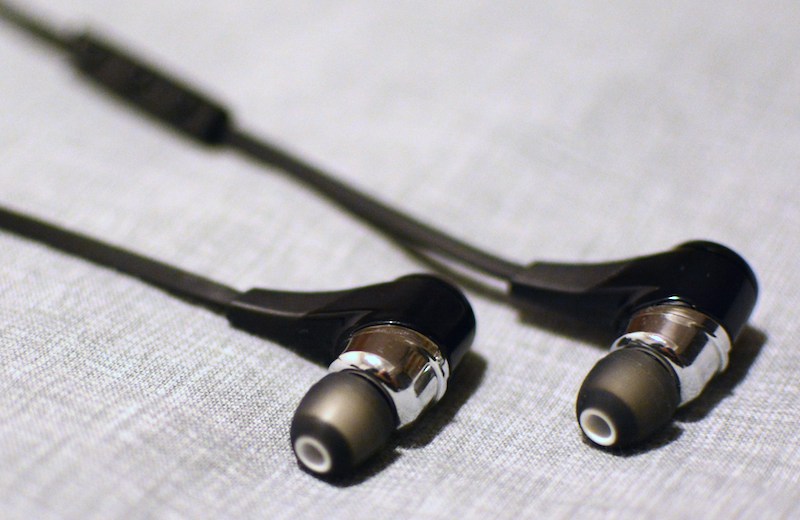
If you have more than on Mac, it can be very useful to mount another system's drives or share another system's screen. Obviously you have to provide a username and a password for this, or the entire internet would be able to get at your Mac once you enable these services in the Sharing pane of the System Preferences.
A few years ago, a new way to log in to another Mac appeared: with your Apple ID...
Read the article - posted 2014-10-20
With all this bluetooth audio going on, I wondered: how much power does playing back audio over bluetooth use? So I tested this. The tests then snowballed as I got curious about audio over Wi-Fi, or having bluetooth and/or Wi-Fi on when the phone is idle. All the tests were done on an iPhone 5 with a freshly replaced battery under iOS 7.
Read the article - posted 2014-10-21
Image link - posted 2014-10-26
Image link - posted 2014-11-03
My latest story on Ars Technica, where I look at the networking technologies that power Continuity:
❝If you have the latest Mac and the latest iPhone or iPad running Apple's latest OSes, and if you have Wi-Fi and Bluetooth turned on, the new Continuity features work like magic. What powers that magic? A wide range of network options, including Bluetooth Low Energy (BTLE), peer-to-peer Wi-Fi, regular local networking, and iCloud/iMessage. Each aspect of Continuity actually picks and chooses from these connectivity options, sometimes using more than one.❞
Read the article - posted 2014-11-03
Image link - posted 2014-11-07
Image link - posted 2014-11-08
I'm in Honolulu for the IETF meeting this week. As always, on sunday morning before the meeting proper starts, there's the IEPG, where there's always interesting stuff being presented, usually from the operational side of networking.
Today, there were talks about IPv6 packets with extension headers being dropped, routing table and packet size issues by Geoff Huston, and a discussion on Shim6 and Multipath TCP (MPTCP) failure recovery by Brian Carpenter. All good stuff. However, at the end of Brian's presentation, Lorenzo Colitti thanked Brian for the interesting presentation about the performance of undeployable protocol A vs undeployable protocol B.
Read the article - posted 2014-11-09
This is a great tip from CGP Grey: when you're with a group of people and you need to decide between several options (what/where to eat, what movie to watch), rather than vote the regular way, let everyone vote for each option they find acceptable. I.e., you get to vote multiple times.
Read the article - posted 2014-11-26
My Ars Technica review of iWork'14, even though Apple no longer uses that name for Keynote, Pages and Numbers.
The first one I did was iWork'08 back in 2007. Almost year and a half later it was time for iWork'09 and then last year there was iWork'13. I wasn't entirely happy with any of them. I guess some things don't change.
![]()
Read the article - posted 2014-11-28
Image link - posted 2014-12-08
Jean-Louis Gassée over at Monday Note has an interesting article talking about how cameras used to last for decades back in the analog days, while they're obsolete within a year or two now that they're digital. And how the same thing is about to happen to the watch: an old mechanical watch will keep doing its thing for decades (I'm assuming some upkeep here), but not so much for an Apple Watch:
❝There’s no carrier subsidy for the AppleWatch. That could be a problem when Moore’s Law makes the $5K high-end model obsolete.❞
I'm not so sure Moore's Law is going to make the Apple Watch obsolete within just a few years.
Read the article - posted 2014-12-08
I got myself an iPhone 6 last month. Because it has a larger battery than previous iPhones but the iPhone chargers have remained the same since the iPhone 3G days, I was a bit worried about how long it takes to charge the iPhone 6...
Read the article - posted 2014-12-16
Image link - posted 2014-12-17
After some heated discussions about packet sizes on the mailinglist of the IETF v6ops working group, I decided to do some measurements to find out what maximum packet sizes are supported on today's internet...
Read the article - posted 2014-12-17
Please read yesterday's post Maximum packet sizes on the internet first. There, I looked at the maximum supported packet sizes that are included in the TCP MSS option in HTTP requests to my server. Today I'll look at the values in ICMP(v6) "too big" messages.
In almost a week, I received zero IPv4 "too big" messages.
So it seems in the IPv4 world, path MTU discovery is dead.
Read the article - posted 2014-12-18
Yesterday, I wrote:
❝In almost a week, I received zero IPv4 "too big" messages.So it seems in the IPv4 world, path MTU discovery is dead.❞
However, João Taveira Araújo told me that he sees a good number of IPv4 ICMP "too big" messages. Those seem to result from SSL traffic. At first, that seemed strange, as SSL is just payload for TCP so TCP MSS clamping should work on SSL sessions the same as on non-SSL sessions.
But then I realized that this traffic could be SSL VPNs. If a VPN gateway takes an IPv4 packet and encapsulates that in SSL in a single TCP segment, then the size of those TCP segments isn't influenced by MSS clamping, so too big messages will be generated if the path MTU is smaller than the MTUs of the endpoints of the SSL connection. I wonder if those SSL VPN implementations handle path MTU discovery properly, though.
Permalink - posted 2014-12-19
I wasn't even sure I was going to get the new iPhone this year, even though I've been upgrading iPhones every other year until now. I liked the long battery life of the iPhone 6+ as well as the 1920x1080 screen—until it turned out that Apple uses some weird scaling tricks rather than the native resolution. And I wasn't sure I could handle the size and weight of the 6+. The 6, on the other hand, didn't seem to come with any must-have features. And maybe it's silly, but the notion of having to replace my iPhone 5 cases and its dock also made upgrading significantly less appealing.
But then the sleep/wake button of my iPhone 5 started to act up, and after the earlier battery replacement, I started to doubt whether I'd get another year of good use out of it. So I got the black space gray 64 GB iPhone 6.
❝The Interview is now available on Youtube.❞
But of course doing the right thing for free speech, not letting the terrorists win, all that good stuff, takes a back seat to the need to parcel out content piecemeal region-wise:

Although it has a number of limitations, the iPhone 6 camera can take really nice photos.

Image link - posted 2014-12-28
The iPhone 6's networking can be very fast, but it all depends on the SIMs, Wi-Fi base stations, frequency bands and transfer protocols.
